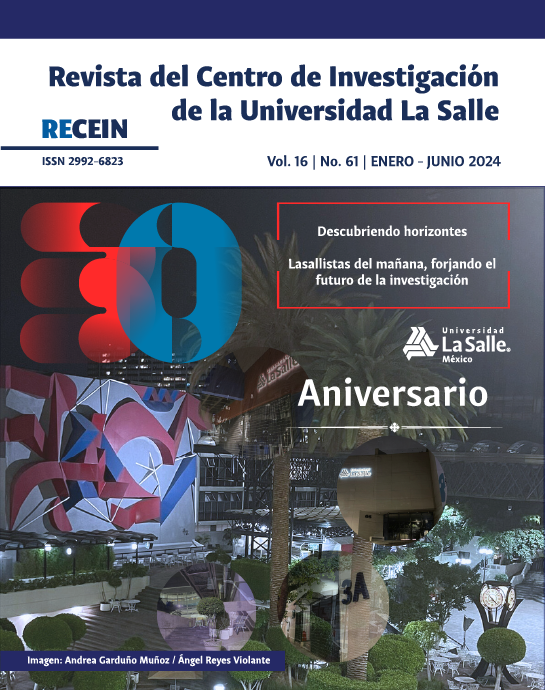Prácticas sostenibles en el desempeño financiero de empresas mexicanas1313
Contenido principal del artículo
Resumen
Las prácticas sustentables representan para las compañías una opción para mantener un nivel de competitividad en el mercado y (finanzas saludables) un estado financiero saludable. Mantener un desempeño financiero sostenible permite un crecimiento adecuado bajo acciones de responsabilidad social empresarial (RSE). El objetivo principal de la investigación es analizar el efecto de las prácticas de RSE en el desempeño financiero en empresas de la Bolsa Mexicana de Valores (BMV); para lograr lo anterior, se recolectó, de fuentes secundarias, datos de 109 empresas que cotizan en la Bolsa Mexicana de Valores entre el 2011 al 2018; finalmente, se efectuó un análisis de datos de panel. Los resultados muestran un efecto positivo y significativo de las prácticas sostenibles conjuntas (ESG scores) en el desempeño financiero, manteniendo el mismo efecto en su score individual. Este hallazgo refuerza el impacto positivo de las prácticas de responsabilidad social corporativa como prácticas sostenibles para las corporaciones mexicanas, así como la creación de valor para ser consideradas a los intereses de los inversionistas.
Descargas
Detalles del artículo

Esta obra está bajo una licencia internacional Creative Commons Atribución-NoComercial-CompartirIgual 4.0.
Esta revista se encuentra bajo la licencia de Creative Commons, por tanto, los autores, al postular su artículo, lo adhieren a dicha licencia.El autor puede disponer de su artículo para su archivo en repositorios institucionales o en páginas web personales, con la referencia y agradecimientos a la fuente donde se ha publicado.
Citas
Albitar, K., Hussainey, K., Kolade, N., & Gerged, A. (2020). ESG disclosure and firm performance before and after IR: The moderating role of governance mechanisms. International Journal of Accounting & Information Management, 28(3), pp. 429-444. https://doi.org/10.1108/IJAIM-09-2019-0108
Altman, E. I. (1968). Financial ratios, discriminant analysis and the prediction of corporate bankruptcy. The Journal of Finance, 23(4), 589-609. https://doi.org/10.2307/2978933
Barnett, M. (2007). Stakeholder influence capacity and the variability of financial returns to corporate social responsibility. Academy of management review, 32(3), 794-816. https://doi.org/10.5465/amr.2007.25275520
Belu, C. (2009). Ranking corporations based on sustainable and socially responsible practices. A data envelopment analysis (DEA) approach. Sustainable Development, 17(4), 257-268. https://doi.org/10.1002/sd.390
Benavides, J. & Mongrut, S. (2010). Governance Codes: Facts or Fictions? A Study of Governance Codes in Colombia. Estudios Gerenciales, 26(117), 85-102. https://doi.org/10.1016/S0123-5923(10)70135-2
Bocken, N., Short, S., Rana, P. & Evans, S., (2013). A value mapping tool for sustainable business modelling. Corp. Govern. 13(5), 482-497. https://doi.org/10.1108/CG-06-2013-0078
Boons, F., & Lüdeke-Freund, F. (2013). Business models for sustainable innovation: state-of-the-art and steps towards a research agenda. Journal of Cleaner production, 45, 9-19. https://doi.org/10.1016/j.jclepro.2012.07.007
Busch, T., & Hoffmann, V. H. (2011). How hot is your bottom line? Linking carbon and financial performance. Business & Society, 50(2), 233-265. https://doi.org/10.1177/0007650311398780
Cameron, C., & Trivedi, K. (2008). Microeconometrics using stata. Stata Press.
Chang, D. S., & Kuo, L. C. R. (2008). The effects of sustainable development on firms' financial performance–an empirical approach. Sustainable Development, 16(6), 365-380. https://doi.org/10.1002/sd.351
Chen, E. & Nowland, J. (2010). Optimal Board Monitoring in Family-owned Companies: Evidence from Asia. Corporate Governance: An International Review, 18(1), 3-17. https://doi.org/10.1111/j.1467-8683.2009.00778.x
Chen, Z., & Xie, G. (2022). ESG disclosure and financial performance: Moderating role of ESG investors. International Review of Financial Analysis, 83, 102291. https://doi.org/10.1016/j.irfa.2022.102291
Cheng, L., Lee, S., Li, S., & Tsang, C. (2023). Understanding resource deployment efficiency for ESG and financial performance: A DEA approach. Research in International Business and Finance, 65, 101941. https://doi.org/10.1016/j.ribaf.2023.101941
Clementino, E., & Perkins, R. (2020). How Do Companies Respond to Environmental, Social and Governance (ESG) Ratings? Evidence from Italy. Journal of Business Ethics, 9(2), 379-397. https://doi.org/10.1007/s10551-020-04441-4
Dixon-Fowler, H., Slater, D., Johnson, J., Ellstrand, A., & Romi, A., (2013). Beyond “does it pay to be green?” A meta-analysis of moderators of the CEP–CFP relationship. Journal of Business Ethics, 112(2), 353-366. https://doi.org/10.1007/s10551-012-1268-8
Eccles, R., Ioannou, I., & Serafeim, G. (2014). The impact of corporate sustainability on organizational processes and performance. Management Science, 60(11), 2835-2857. https://doi.org/10.1287/mnsc.2014.1984
Escobar, N., Benavides, J., & Perafán, H. (2016). Gobierno corporativo y desempeño financiero: conceptos teóricos y evidencia empírica. Cuadernos de contabilidad, 17(43), 203-254.
Fama, E. & Jensen, M. (1983). Separation of Ownership and Control. Journal of Law and Economics, 26(2), 301- 325.
Fang, M., Nie, H., & Shen, X. (2023). Can enterprise digitization improve ESG performance? Economic Modelling, 118, 106101. https://doi.org/10.1016/j.econmod.2022.106101
Flammer, C. (2013). Corporate social responsibility and shareholder reaction: The environmental awareness of investors. Academy of Management Journal, 56(3), 758-781. https://doi.org/10.5465/amj.2011.0744
Frynas, J., & Yamahaki, C. (2016). Corporate social responsibility: Review and roadmap of theoretical perspectives. Business Ethics: A European Review, 25(3), 258-285. https://doi.org/10.1111/beer.12115
Garcia-Castro, R., Arino, M., & Canela, M. (2010). Does social performance really lead to financial performance? Accounting for endogeneity. Journal of Business Ethics, 92(1), 107-126. https://doi.org/10.1007/s10551-009-0143-8
Gavira-Durón, N., Martínez, D., & Espitia, I. (2020). Determinantes financieras de la Sustentabilidad Corporativa de Empresas que cotizan en el IPC Sustentable de la BMV. Revista mexicana de economía y finanzas, 15(2), 277-293. https://doi.org/10.21919/remef.v15i2.485
Giannopoulos, G.; Kihle Fagernes, R.V.; Elmarzouky, M.& Afzal Hossain, K.A. (2023). The ESG Disclosure and the Financial Performance of Norwegian Listed Firms. J. Risk Financial Manag, 15(6), 237. https://doi.org/10.3390/jrfm15060237
Haffar, M., & Searcy, C. (2017). Classification of trade-offs encountered in the practice of corporate sustainability. Journal of business ethics, 140(3), 495-522. https://doi.org/10.1007/s10551-015-2678-1
Hong, Y., & Andersen, M. L. (2011). The relationship between corporate social responsibility and earnings management: An exploratory study. Journal of Business Ethics, 104(4), 461-471. https://doi.org/10.1007/s10551-011-0921-y
Huerta, P., & Navas, J. (2006). Grado y dirección de la diversificación de las empresas industriales españolas: un análisis de la estrategia de la estrategia de diversificación relacionada. Ingeniare. Revista chilena de ingeniería, 14(3), 213-228. https://doi.org/10.4067/S0718-33052006000200005
Iazzolino, G., & Laise, D. (2016). Value creation and sustainability in knowledge-based strategies. Journal of Intellectual Capital, 17(3), 457-470. https://doi.org/10.1108/JIC-09-2015-0082
Jensen, M., & Meckling, W. (1976). Theory of the firm: Managerial behavior, agency costs and ownership structure. Journal of Financial Economics, 3(4), 305-360. https://doi.org/10.1016/0304-405X(76)90026-X
Khizar, H., Iqbal, M., & Rasheed, M. (2021). Business orientation and sustainable development: A systematic review of sustainability orientation literature and future research avenues. Sustainable Development, 29(5), 1001-1017. https://doi.org/10.1002/sd.2190
Kim, J. W., & Park, C. K. (2023). Can ESG Performance Mitigate Information Asymmetry? Moderating Effect of Assurance Services. Applied Economics, 55(26), 2993-3007. https://doi.org/10.1080/00036846.2022.2107991
Lai, K., & Wong, C. (2012). Green logistics management and performance: Some empirical evidence from Chinese manufacturing exporters. Omega, 40(3), 267-282. https://doi.org/10.1016/j.omega.2011.07.002
Lee, K., Min, B., & Yook, K., (2015). The impacts of carbon (CO2) emissions and environmental research and development (R&D) investment on firm performance. International Journal of Production Economics, 167, 1-11. https://doi.org/10.1016/j.ijpe.2015.05.018
Liao, H., Deng, Q., Wang, Y., Guo, S., & Ren, Q. (2018). An environmental benefits and costs assessment model for remanufacturing process under quality uncertainty. Journal of Cleaner Production, 178, 45-58. https://doi.org/10.1016/j.jclepro.2017.12.256
López, M., Garcia, A., & Rodriguez, L. (2007). Sustainable development and corporate performance: A study based on the Dow Jones sustainability index. Journal of business ethics, 75(3), 285-300. https://doi.org/10.1007/s10551-006-9253-8
Margolis, J., Elfenbein, H., & Walsh, J. (2007). Does it pay to be good? A meta-analysis and redirection of research on the relationship between corporate social and financial performance. Ann Arbor, 1001, 48109-1234.
McWilliams, A., & Siegel, D. (2001). Corporate social responsibility: A theory of the firm perspective. Academy of management review, 26(1), 117-127. https://doi.org/10.5465/amr.2001.4011987
Montabon, F., Sroufe, R., & Narasimhan, R. (2007). An examination of corporate reporting, environmental management practices and firm performance. Journal of operations management, 25(5), 998-1014. https://doi.org/10.1016/j.jom.2006.10.003
Naciones Unidas (2015). Transforming our world: the 2030 Agenda for Sustainable Development. Division for Sustainable Development Goals: New York, NY, USA.
Nelling, E., & Webb, E. (2009). Corporate social responsibility and financial performance: the “virtuous circle” revisited. Review of Quantitative Finance and Accounting, 32(2), 197-209. https://doi.org/10.1007/s11156-008-0090-y
Pagell, M., & Wu, Z. (2009). Building a more complete theory of sustainable supply chain management using case studies of 10 exemplars. Journal of supply chain management, 45(2), 37-56. https://doi.org/10.1111/j.1745-493X.2009.03162.x
Pesaran, M. (2004). General Diagnostic Tests for Cross Section Dependence in Panels. SSRN Scholarly Paper Núm. ID 572504. https://dx.doi.org/10.2139/ssrn.572504
Porter, M., & Kramer, M. (2006). The link between competitive advantage and corporate social responsibility. Harvard business review, 84(12), 78-92.
Ramdani, D. & Witteloostuijn, A. (2010). The Impact of Board Independence and CEO Duality on Firm Performance: A Quantile Regression Analysis for Indonesia, Malaysia, South Korea and Thailand. British Journal of Management, 21(3), 607-627. https://doi.org/10.1111/j.1467-8551.2010.00708.x
Rauter, R., Jonker, J., & Baumgartner, R. (2017). Going one's own way: drivers in developing business models for sustainability. Journal of Cleaner Production, 140, 144-154. https://doi.org/10.1016/j.jclepro.2015.04.104
Rubalcava, C., & Zerón, M. (2020). La empresa social: contexto mexicano. CIENCIA ergo-sum, 27(3). https://doi.org/10.30878/ces.v27n3a3
Sadeghi, G., Arabsalehi, M., & Hamavandi, M. (2016). Impact of corporate social performance on financial performance of manufacturing companies (IMC) listed on the Tehran Stock Exchange. International Journal of Law and Management, 58(6), 637-669. https://doi.org/10.1108/IJLMA-06-2015-0029
Saeidi, S., Sofian, S., Saeidi, P., Saeidi, S., & Saaeidi, S. (2015). How does corporate social responsibility contribute to firm financial performance? The mediating role of competitive advantage, reputation, and customer satisfaction. Journal of business research, 68(2), 341-350. https://doi.org/10.1016/j.jbusres.2014.06.024
Schoenherr, T., & Talluri, S. (2013). Environmental sustainability initiatives: A comparative analysis of plant efficiencies in Europe and the US. IEEE Transactions on Engineering Management, 60(2), 353-365. https://doi.org/10.1109/TEM.2012.2198653
Shashi, Centobelli, P., Cerchione, R., & Singh, R. (2019). The impact of leanness and innovativeness on environmental and financial performance: Insights from Indian SMEs. International Journal of Production Economics, 212, 111-124. https://doi.org/10.1016/j.ijpe.2019.02.011
Singh, S., Tabassum, N., Darwish, T. K., & Batsakis, G. (2018). Corporate governance and Tobin's Q as a measure of organizational performance. British Journal of Management, 29(1), 171-190. https://doi.org/10.1111/1467-8551.12237
Skare, M., & Golja, T. (2012). Corporate social responsibility and corporate financial performance–is there a link? Economic research-Ekonomska istraživanja, 25(1), 215-242. https://doi.org/10.1080/1331677X.2012.11517563
Soytas, M. A., Denizel, M., & Usar, D. D. (2019). Addressing endogeneity in the causal relationship between sustainability and financial performance. International Journal of Production Economics, 210, 56-71. https://doi.org/10.1016/j.ijpe.2019.01.016
Surroca, J., Tribó, J. A., & Waddock, S. (2010). Corporate responsibility and financial performance: The role of intangible resources. Strategic management journal, 31(5), 463-490. https://doi.org/10.1002/smj.820
Suttipun, M., & Dechthanabodin, P. (2022). Environmental, Social and Governance (ESG) Committees and Performance in Thailand. Asian Journal of Business and Accounting, 15(2), 205-220. https://doi.org/10.22452/ajba.vol15no2.7
Tampakoudis, I., & Anagnostopoulou, E. (2020). The effect of mergers and acquisitions on environmental, social and governance performance and market value: Evidence from EU acquirers. Business Strategy and the Environment, 29(5), 1865-1875. https://doi.org/10.1002/bse.2475
Turrent, G., & García, M. (2015). La composición del consejo de administración y la estructura accionaria como factores explicativos de la transparencia en el gobierno corporativo en Latinoamérica: evidencia en empresas cotizadas de Argentina, Brasil, Chile y México. Estudios Gerenciales, 31(136), 275-286. https://doi.org/10.1016/j.estger.2015.02.001
Wagner, M., & Blom, J. (2011). The reciprocal and non‐linear relationship of sustainability and financial performance. Business Ethics: A European Review, 20(4), 418-432. https://doi.org/10.1111/j.1467-8608.2011.01622.x
Wang, H., & Choi, J. (2013). A new look at the corporate social–financial performance relationship: The moderating roles of temporal and interdomain consistency in corporate social performance. Journal of management, 39(2), 416-441. https://doi.org/10.1177/0149206310375850
Wooldridge, J. M. (2010). Econometric analysis of cross section and panel data. MIT Press.
Wut, T. M., & Ng, A. W. (2015). World conference on technology, innovation and entrepreneurship CSR practice and sustainable business performance: Evidence from the Global Financial Centre of China. Procedia-Social and Behavioral Sciences, 195, 133-141. https://doi.org/10.1016/j.sbspro.2015.06.421
Yadav, P. L., Han, S. H., & Kim, H. (2017). Sustaining competitive advantage through corporate environmental performance. Business Strategy and the Environment, 26(3), 345-357. https://doi.org/10.1002/bse.1921
Yu, X. & Xiao, K. (2022) Does ESG Performance Affect Firm Value? Evidence from a New ESG-Scoring Approach for Chinese Enterprises. Sustainability, 14(24), 16940. https://doi.org/10.3390/su142416940
Zeng, L. & Jiang, X. (2023). ESG and Corporate Performance: Evidence from Agriculture and Forestry Listed Companies. Sustainability, 15(8), 6723. https://doi.org/10.3390/su15086723
Zhou, G., Liu, L., & Luo, S. (2022). Sustainable development, ESG performance and company market value: Mediating effect of financial performance. Business Strategy and the Environment, 31(7), 3371-3387. https://doi.org/10.1002/bse.3089
Zhou, S.; Rashid, M.H.U.; Mohd. Zobair, S.A.; Sobhani, F.A. y Siddik, A.B. (2023). Does ESG Impact Firms’ Sustainability Performance? The Mediating Effect of Innovation Performance. Sustainability, 15, 5586. https://doi.org/10.3390/su15065586
 English
English


